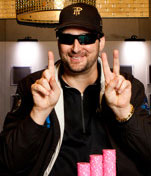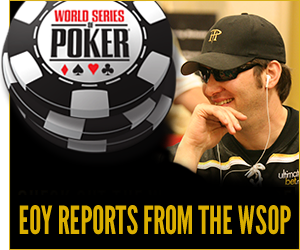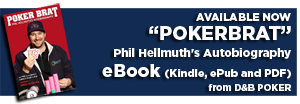-
Good Read, Bad Outcome
For 12 days in early February, I played in the Premier League poker tournament. This one-of-a-kind event features 12 players in six heats, six players per heat, for points. The top four point earners advance to the six-player finals, the middle four point earners play heads-up for the other two seats and the bottom four are “relegated” (a common word in European sports, meaning something like “sent down to the minors”). The players receive nine points for first place, five for second, three for third, two for fourth, one for fifth and zero for sixth place. This year, you needed 18 points to advance to the heads-up portion, and only 21 points to make the top four. With an average of 20 points per heat, hitting 18 is almost too easy, right?
Alas, not for me. I was well on my way to breaking a record, but the wrong kind of record — the lowest points total ever! In the end, I had scored an abysmal eight points. At least I avoided tying the all-time low of seven points. This year, the players were Rolande de Wolfe, Andy Black, Eddy Scharf, Ian Frazer, Juha Helppi, Dave Ulliott, Tony G., Annie Duke, Marcel Luske, Vicky Coren, Alex Kravchenko and me.
After four heats, I had a total of five points, and I needed a first or a second to remain in contention. The following hand came up in my fifth heat, with the blinds at $1,000 to $2,000. In late position, I raised it up to $7,000 to go with 5d-2d, Coren called on the button, and the flop was K-6-3, giving me a straight draw. I checked and then announced, “Vicky, I’m calling whatever you bet!” Coren, it seemed to me, looked nervous as she bet out $12,000. I called, the turn was a two, giving me a pair, and we both checked. The river was a queen, I checked, and Coren bet $16,000. I called, and she showed me A-Q.
Let’s take a closer look at this hand. My pre-flop raise with 5d-2d was a little loose for my taste. A raise here is marginal, and if not a raise, then I would prefer folding the hand. Coren’s pre-flop call with A-Q is natural for her, but some would argue that a reraise here — perhaps to $24,000 — would have been better. On the flop, my check was OK, but a bet would have been all right, too. I had checked on the flop in order to use my reading abilities on Coren.
Her $12,000 bet on the flop was fine, but I would like to have seen her bet $17,000 into the $17,000 pot, because, throughout her heats, she had bet the size of the pot when she was strong. Her $12,000 bet — less than the size of the pot — seemed to me a “tell” that she was weak. Besides, she had stumbled a bit and seemed nervous. (Coren might want to work on bluffing more smoothly.) My call on the flop was weak, but Coren’s flop bet can be interpreted, and acted on, in just three ways: folding, calling or raising.
First, if I thought Coren was strong, then folding my hand would have been the right move. Second, if I thought she was weak, then a call is marginal. Finally, if I thought Coren was weak, then a raise would have been the best move. Of course, I thought she was weak, owing both to her gestures and the undersized $12,000 bet. Thus, I should have raised it up right there, and presumably I would have won the pot. On the turn, my check was fine, but a bet would have been OK, too.
The case for checking is this: My check allows me to win extra money if Coren bluffs again; and if I do have the better hand, it is unlikely she would outdraw me; finally, a check allows me to lose less money if I choose to change my read, say, to Coren being strong.
The case for betting is this: Coren wouldn’t dare try to bluff me again, and my checking allows her a chance to hit a winning card “for free.” Ironically, if anything other than a five, a four or a deuce had hit on the turn, I would have made a bet and won the pot. So, in effect, improving my hand caused me to lose the pot!
On the river, I liked my check, and I loved Coren’s $16,000 bet. A nice bet, because it suggested she had me for a pocket pair like 10-10, 9-9 or something similar. It didn’t look as if she thought I had a king, because I had checked on the flop, the turn and the river. My call on the river was natural. After all, I thought she had been weak on both the flop and the turn. I pretty much knew she didn’t have a king (she would have bet more money on the flop) or a pocket pair between Q-Q and 7-7, because it wasn’t in her game to value-bet a hand like that. She had to have either nothing or exactly a queen. And that’s what she had — a queen.
Related Posts
- Trust Your Instincts
- Sully’s Bad Beat – And His Cool Tattoo
- Shak Fires the Third Bullet
- Managing Fatigue Reduces Bad Reads, Sloppy Bets, and Losses
- Hello, Old Friend
- At Bay 101, a Bad Play and a Bad Beat
- All Poker All the Time
- LA Story: And Then There Were Six
- Youth is Served — With a “False Tell”
- Another Late-Night Poker Gambit
Recent Posts
- WSOPE 2nd place finish
- Update from this years WSOP 2019
- Happy Holidays! Updated stock at Poker Brat, new book!
- Phil Hellmuth wins historic 15th World Championship!
- Final golden ticket winner coming soon
- Poker Brat – The Phil Hellmuth Jr. Autobiography
- Phil Hellmuth’s “Pokerbrat” – Coming soon to audio book!
- Poker Night in America – Sugar House Casino
- Sugar House w Matt Glantz
- Lost and found

 ™
™








